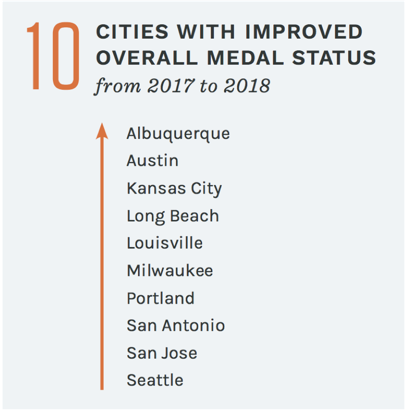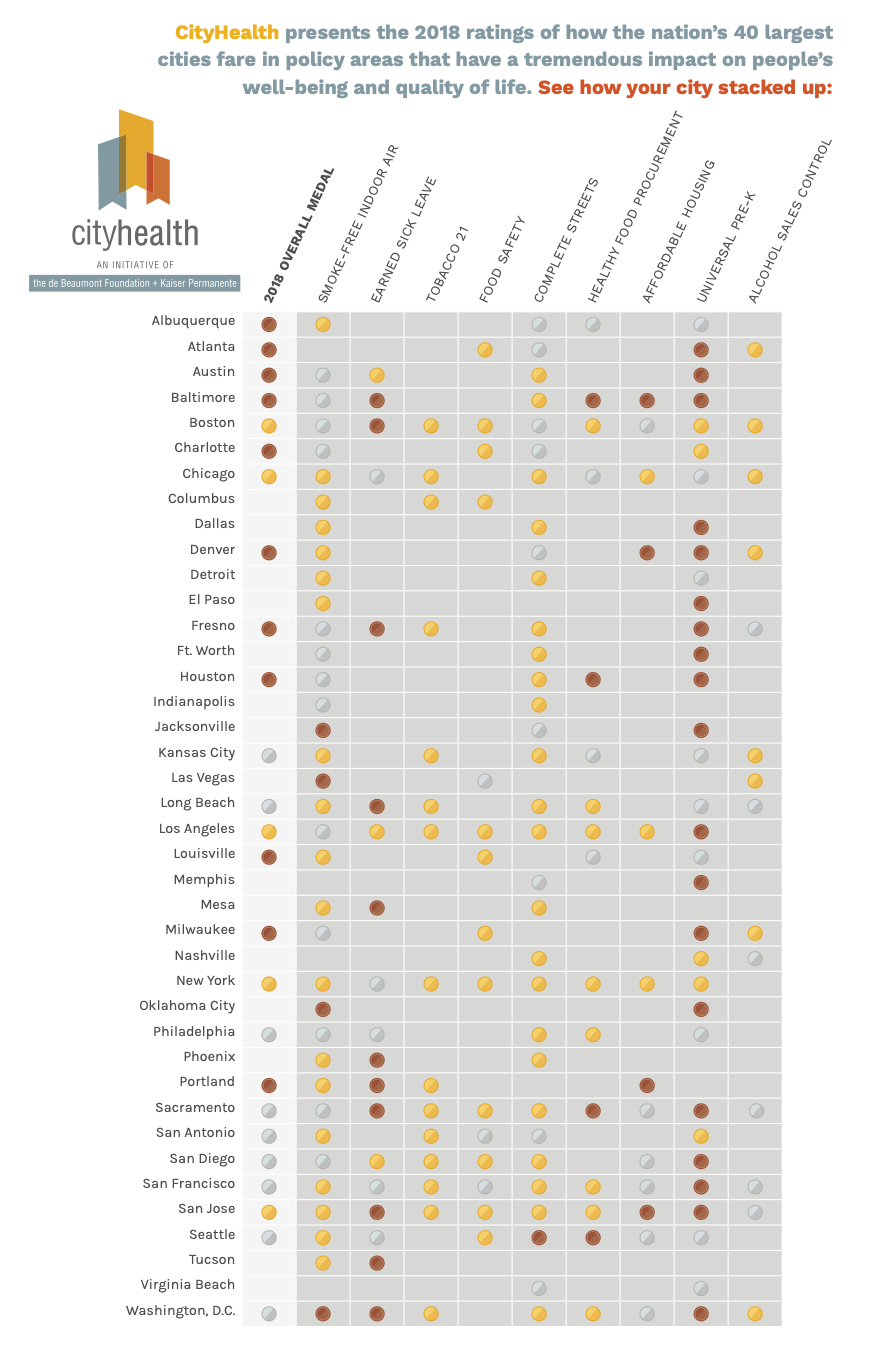By Brian C. Castrucci, Shelley Hearne, Catherine D. Patterson, Loel Solomon and Julie Hutcheson Stoss
Every person, in every city, deserves to live the healthiest possible life. An initiative of the de Beaumont Foundation and Kaiser Permanente, CityHealth is built on this belief and uses policy to make it a reality, helping millions of people live longer, better lives in vibrant, prosperous communities.
Policy is one of our most powerful tools to improve people’s lives and help cities thrive. CityHealth provides municipal leaders with a pragmatic, achievable, yet aspirational, package of policies based in research, backed by qualified experts, and shown to have bipartisan support, making them rich opportunities for cities to pursue.

Bechara Choucair, MD Senior Vice President and Chief Community Health Officer at Kaiser Permanente; Kansas City Mayor Sly James; Shelley Hearne, DrPH, President of CityHealth; and Brian C. Castrucci, DrPH, MA, President and CEO, of the de Beaumont Foundation
The health of a community lies in far more than just medical care. It is in how transportation is designed, in the homes we live in, in the food we have access to, and more. That’s why our package of nine policies consists of conditions that influence health: affordable housing, alcohol outlet density, complete streets, earned sick leave, food safety and restaurant grading, healthy food procurement, high quality universal pre-kindergarten, smoke-free indoor air, and Tobacco 21. The breadth of this menu highlights that the conditions that advance health are not limited to the spaces within hospitals and medical offices and that everyone can play a role in creating healthy, thriving cities.
By rating each city on its progress toward achieving gold in these nine policies, CityHealth’s data also gives residents a way to hold their elected officials accountable for taking the steps necessary to make their cities thrive. CityHealth’s goal is for all municipal leaders to use the policy package as a tool to work together and move toward the gold level for each policy. CityHealth’s 40-city annual assessment combines innovative legal analysis with the input of national experts to determine the standard for each policy. We identified which elements are necessary for the best quality policy (gold), a good quality policy (silver), and a passable quality policy (bronze). Cities that do not meet the bronze metrics or have no policy in place receive no medal.
CHOOSING THE POLICIES
CityHealth rates the nation’s 40 largest cities based on their progress in adopting an evidence-based policy package. This package was derived using a three-part process that considered: 1) the evidence base of policies addressing the key social determinants of health; 2) cities’ jurisdictional authority and precedent; and 3) analysis by a policy advisory committee representing key partners, influencers, and community representatives.
Similar to the Centers for Disease Control and Prevention’s (CDC) HI-5 initiative, CityHealth started with policies that leading authorities, such as the Robert Wood Johnson Foundation’s County Health Rankings, the National Academy of Medicine, and the CDC’s Community Guide, determined as having sufficient evidence/expert opinion to provide important health benefits. Policies were sorted into key categories related to how they addressed the conditions and circumstances in which people live that affect health outcomes: education, environment, financial security, housing, nutrition, public safety, tobacco control, and transportation.
The focus was exclusively on upstream policies that prevent health problems, not on medical treatment and care. CityHealth also determined that at least one policy should be under the direct authority of the local public health agency (rather than a city council, zoning board, or other decision maker). Policies were further filtered by jurisdictional authority–only policies that could potentially be actionable at the city level were considered. CityHealth conducted a feasibility assessment, drawing from national subject matter experts and a policy advisory committee representing influential parties in a local policymaking process, which included a mayor, a chamber of commerce representative, a public health dean, and community leaders.
 The CityHealth package is not intended to be an exhaustive list. Rather nine policies were selected that met the specific criteria above to improve health, with the greatest potential to improve people’s lives.
The CityHealth package is not intended to be an exhaustive list. Rather nine policies were selected that met the specific criteria above to improve health, with the greatest potential to improve people’s lives.
CITY ASSESSMENT RESULTS
Some cities are making real progress across our nine policy recommendations and demonstrating leadership in implementing policies that will improve residents’ lives. The 2018 CityHealth assessment showed significant gains since the first CityHealth assessment the year prior. In 2017, more than half of the 40 cities did not receive an overall medal, but in 2018 a majority of the cities  earned gold, silver, or bronze. Five cities earned an overall bronze medal for the first time, four new cities earned an overall silver medal, and one new city earned an overall gold medal. Still, less than 13 percent of cities in the top 40 achieved gold—the same as the previous year.
earned gold, silver, or bronze. Five cities earned an overall bronze medal for the first time, four new cities earned an overall silver medal, and one new city earned an overall gold medal. Still, less than 13 percent of cities in the top 40 achieved gold—the same as the previous year.
At CityHealth, we believe that every unearned gold medal represents an opportunity to use policy as a lever to improve people’s quality of life and well being, and to help their communities thrive. Some cities may not have received enough medals to advance their overall medal status, but they still put strong new policies in place that earned them policy-specific medals. In just one year, cities earned 24 new medals for implementing proven policies to better the lives of the people who live, play, learn and work in their jurisdictions.

CITY LEADERSHIP IS KEY TO ENACT POLICY CHANGE
City leaders and advocates are seeing these policies as opportunities to help improve the health and lives of residents. Last year, we awarded Kansas City, Missouri; San Antonio, Texas; Seattle, Washington; and Louisville, Kentucky; with Health Leadership awards.
These are just a small number of the cities we track and just a few examples of the exciting work that is happening across the country, spearheaded by city leaders and advocates working together to create healthier communities with the support of CityHealth.
Kansas City made great strides in its policies on complete streets. The city’s emphasis on resident safety regardless of how commuters choose to get around—walking, bicycling, public transit or driving—supports a vibrant community.
Helping to lead the national tide to pass Tobacco 21 policies, San Antonio became the first city in Texas to raise the legal purchase age to 21 in 2018, and in June 2019, the entire state of Texas followed suit. By implementing Tobacco 21 policies, cities have the power to help curb the risks of addiction and premature death. This helps people stop before they ever start, since 95 percent of tobacco users start before the age of 21.
Seattle’s city leadership and its residents know that investing in universal and quality pre-kindergarten helps to provide its youngest residents with the best start possible. By passing an education levy in 2018, the city is funding a universal preschool program as a strategy to help eliminate race-based gaps in kindergarten readiness.
Across the country, in Kentucky, Louisville is making the healthy choice the easy choice. The city helps ensure that food and beverage options on public property support residents in pursuit of a healthier lifestyle.
It is a new day in policymaking. Now more than ever, we know how to make our healthy vision a reality. We have more information and more data at our fingertips to help us all live well. CityHealth is working to expand to more cities and increase the number of policies we help advance in partnership with city leaders and advocates, because our cities are strongest when we give every person the opportunity to live a healthy, thriving life.
To learn more about CityHealth, visit www.cityhealth.org.
Brian C. Castrucci is President and CEO of the de Beaumont Foundation. Shelley Hearne is President of CityHealth. Catherine Patterson is Managing Director of Urban Health and Policy at the de Beaumont Foundation. Loel Solomon is Community Health at Kaiser Permanente. Julie Hutcheson Stoss is Vice President of Government Relations at Kaiser Permanente.



